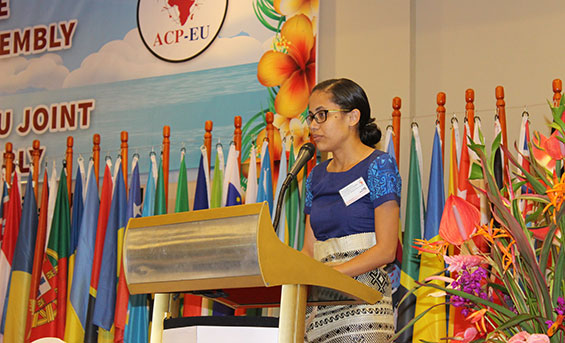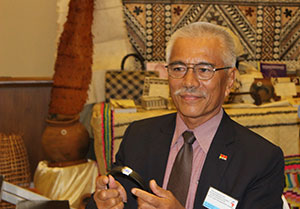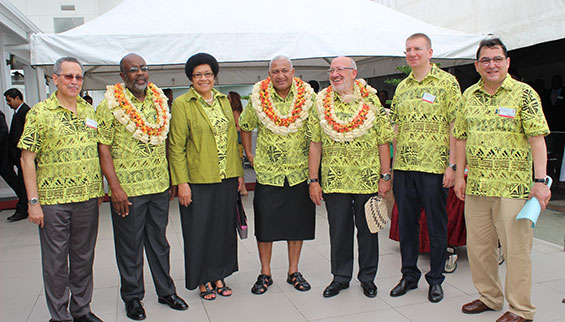Strong calls for climate action at ACP-EU Joint Assembly

Poet and civil society representative from the Marshall Islands Kathy Jetnil-Kijiner, who spoke alongside President Anote Tong of Kiribati and Mr. Feleti Teo, Head of the Western and Central Pacific Fisheries Commission during the keynote debate on Seas & Oceans. Her moving spoken word performance on climate change was met with a standing ovation from the Joint Parliamentary Assembly. (Watch video)
Suva, Fiji, 16 June 2015/ ACP: Members of Parliament from Africa, the Caribbean and the Pacific as well as the European Union joined leaders from the Pacific region in highlighting the urgency and significance of achieving a world-wide legally-binding agreement on climate change at the United Nations’ COP21 climate conference in Paris this December.
During the keynote debate of the 29th ACP-EU Joint Parliamentary Assembly (JPA), in session from the 15-17 June in Suva, Fiji, guest speaker President Anote Tong of Kiribati stressed that concrete action and achievements by the international community, including proposals for “credible technical solutions” to deal with the severest impacts of climate change faced by his own country, remain elusive.
“Many have asked what is it that I expect to come out of summits such as this, or [the COP21 in] Paris at the end of this year. My answer is simple – action,” he told more than a hundred ACP and EU politicians on Tuesday. “Urgent action that would guarantee that the future of our global community will be secured; action that guarantees that no one will be left behind and most importantly, action NOW.”
The upcoming meeting in Paris is one of three major global conferences this year (in addition to the Third International Conference on Financing for Development in July in Addis Ababa, Ethiopia and the United Nations Summit to adopt Post-2015 Development Agenda in New York in September) that influence the world’s development agenda for the next few decades.
The overarching goal of the COP21 meeting is to commit countries to tackling climate change through a legally binding global agreement to reduce greenhouse gas emissions, and limit the global temperature increase to two degrees Celsius above pre-industrial levels.
Pacific Island countries, like other Small Island Developing States (SIDS), are one of the most acutely affected by the impacts of climate change, although they account for only 0.03% of the global greenhouse gas emissions.
“As a global community of nations, we cannot allow our industrialised members – who are the principal carbon emitters – to continue to put their own economic interests and the jobs of their own people before the wellbeing, and in some cases, the very survival of the citizens of the Small Island Developing States,” stated the Prime Minister of Fiji, Hon. Voreqe Bainimarama in opening the meeting earlier this week.
Hon. Bainimarama said that Fiji had identified 600 communities directly threatened by sea level rise, while the neighbouring nations of Kiribati, the Marshall Islands and Tuvalu are in danger of losing their national sovereignty as well as increasing amounts of land within a generation or two, without urgent global action. While decrying the “selfishness” of those developed countries unwilling to act on the climate challenge, the Prime Minister congratulated the European Union for taking the lead in its commitment to reduce carbon emissions by 40% by 2030.
Resolution on Vanuatu
The Co-Chairs of the ACP-EU Joint Parliamentary Assembly Hon. Louis Michel and Hon. Fitz Jackson expressed their support for concrete and transformative outcomes from the global development discussions on climate change, as well as the post-2015 development agenda.
"The decisions taken in international fora… can have major consequences for the development of these countries, which are so far away from the centres of power," said Mr Jackson. “The JPA is uniquely placed to be the advocate of development for the people of the South and the North. Ours is a platform that we can use to engage the world on the fact that development is not a zero sum game, it can and must be a win-win cause”.
The JPA are set to vote on a resolution on the natural disaster that recently devastated the Pacific nation of Vanuatu, which demonstrated the fragility and vulnerability of SIDS economies and the need for resilience-building.
The resolution highlights that climate represents a serious threat to poverty alleviation in the Pacific, with adverse effects for agriculture, fisheries and coral reefs, tourism and health. It further calls on ACP and EU member states to ensure the post-2015 development agenda addresses the needs of ACP SIDS, especially in relation to the impact of climate change and the building of resilience to natural disasters.
ACP forum for SIDS
To better address the issues, the ACP Council of Ministers, at its 101st sitting two weeks ago in Brussels, approved the creation of a special forum for SIDS within the ACP Group. This SIDS forum will work primarily to sensitise stakeholders and the general public to SIDS concerns, as well as mainstream the SIDS agenda in ACP-EU relations, in particular issues captured in the outcome document of the Third International Conference on SIDS, known as the SAMOA Pathway.
(Photo above: President Anote Tonga of Kiribati; below: Dignitaries with the Prime Minister of Fiji Hon. Voreqe Bainimarama (centre) at the traditional ceremony to welcome JPA delegations.)
For more information, contact ACP Press Officer Ms. Josephine Latu-Sanft, latu@acp.int or +32 2 7430617

